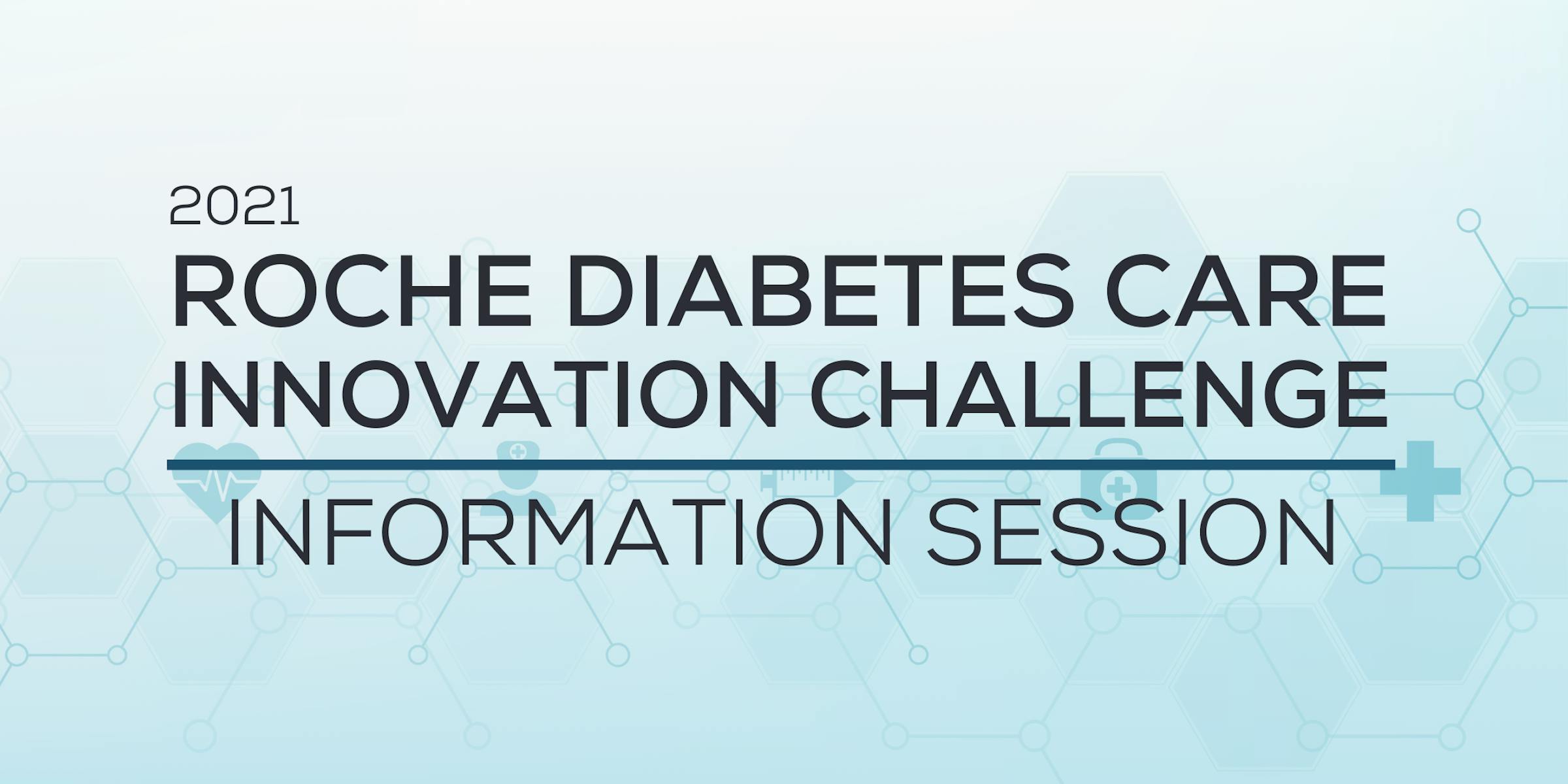Recap: How innovators can help tackle diabetes-related complications and comorbidities
Insights from the 2021 Roche Diabetes Care Innovation Challenge Information Session
On May 6, 2021, MATTER hosted a virtual discussion around minimizing, managing and transforming risks associated with diabetes complications and comorbidities — the focus for the 2021 Roche Diabetes Care Innovation Challenge.
The panelists included Roche Diabetes Care Global Head of Strategy & Customer Solutions Jörg Hölzing, VP of New Product Development Stephen Ranjan and program collaborator Duke Clinical Research Faculty Dr. Jennifer Green. Arun Bhatia, open innovation and startup engagement lead at Roche Diabetes Care moderated the discussion.
The second annual program is seeking novel tools, services and approaches that address one or a combination of three tracks aimed at reducing the role of complications and comorbidities for people living with diabetes.
Responses have been edited slightly for length and clarity.
A focus on integrated personal diabetes management solutions
Jörg: “Our overall aim is truly integrated and personalized diabetes management solutions. We want to enable patients to master the complexity of this disease and support the transformation of the healthcare system to provide more sustainable and efficient care. Our portfolio is very large: it comprises hardware solutions in the area of glucose monitoring solutions, insulin delivery solutions and a broad portfolio of digital solutions, both for people with diabetes and healthcare practitioners, which makes Roche unique.”
Monitoring progression of risks in people with diabetes
Stephen: “We’re looking for ways to make monitoring progression easier for both people with diabetes and their caregivers. People with diabetes see doctors fairly often, but diabetes care is in large part in the patient’s hands — and it’s very much dependent on how they live their lives every day, the choices that they make and the support that they have in making the choices that preserve their health over the long run… We want to ensure that we’re providing not only safe and usable products, but that they are ultimately effective in driving outcomes.”
Jörg: “How can we make the solutions as easy as possible to provide as much meaningful information as needed? This is the starting point of diabetes management innovation. If you cannot surface data because you cannot gather it and bring it together, you won’t be able to tackle those challenges early on when they are still preventable.”
“How can we make the solutions as easy as possible to provide as much meaningful information as needed? This is the starting point of diabetes management innovation.” – Jörg Hölzing
Empowering people with diabetes and their providers to actively manage diabetes-related risks
Jörg: ”Despite seeing doctors quite often [people with diabetes] can average less than five hours of time with a doctor per year. This means that the rest of the year, the person is on their own. Yet, they sometimes have to make up to 20 or 30 different therapy decisions in a single day. And for each of those therapy decisions, they need to incorporate different inputs. This is a very overwhelming and complex task for a lot of people out there. We really believe that in order to support people with diabetes here and also support healthcare professionals, to be able to have better data when making therapy decisions, we need to bring all these different data points together… We really believe in an open diabetes ecosystem that allows people with diabetes to bring different devices and different solutions together, combines the data and empowers that person to make the best decision at that moment. That is the core of our approach.”
Jennifer: “I want to make sure that we approach diabetes management in a positive way, because with respect to diabetes-related complications, we have very powerful tools to intervene and reduce the risk of serious complications for people with diabetes. The focus is on identifying the risk of complications or presence of complications early and making sure they’re addressed appropriately.”
Enabling smarter and more targeted interventions that slow, stop or reverse the progression of diabetes-related risks
Jennifer: “It is possible to keep people with diabetes complications at an early stage for long periods of time. They don’t have to experience a significant worsening of their condition if the intervention is introduced early. It is a matter of understanding the evidence of those complications and then getting everybody to take it seriously. It’s not just the responsibility of the individual with diabetes — it’s everyone in their orbit. The person who’s providing care, prescribing interventions and probably their family as well. It’s a shared responsibility.”
“It’s not just the responsibility of the individual with diabetes — it’s everyone in their orbit. The person who’s providing care, prescribing interventions and probably their family as well.” – Dr. Jennifer Green
The need for collaboration
Stephen: ”I don’t think there’s one entity in the ecosystem that can solve this. The ability to work together, the ability to shape a solution, to learn together — those are the things that make this challenge exciting?.”
Advice for startups applying to the challenge
Jennifer: “Outcomes don’t have to be as dramatic as preserving someone’s kidney health; outcomes can be related to patient satisfaction, or more basic like adherence to prescribed medication. It’s okay to think about outcomes in an accessible way.”
Jörg: “Don’t search for the golden nugget out there.Rather, think about what you could accomplish at the intersection of different already existing solutions. Don’t introduce technology that adds a new process and more work for everyone involved, but think about combining existing parts of a solution to a new one that increases patient satisfaction or improves outcomes.
“Innovators have a great opportunity by participating in the program, a chance to receive great feedback from our Roche Diabetes Care coaches. So come and join us!”
Stephen: “Focus on the person with diabetes and put that at the center of everything you’re doing. Really understand and empathize with them, make sure you can articulate the pain point that you’re trying to tackle, and bring that to life in your application.”
“Focus on the person with diabetes and put that at the center of everything you’re doing. Really understand and empathize with them, make sure you can articulate the pain point that you’re trying to tackle, and bring that to life in your application.” – Stephen Ranjan
Selected applicants will participate in a phased incubator and accelerator program and collaborate with key stakeholders at Roche Diabetes Care and thought leaders from the MATTER community to identify pilot opportunities. This year’s program also includes the opportunity to collaborate with Duke Clinical Research Institute (DCRI), part of the Duke University School of Medicine — the world’s largest academic clinical research organization.
Applications for the Roche Diabetes Care Innovation Challenge have been extended and are due Monday, May 31 at 11:59pm.
Other questions? Read the challenge FAQ or email rdc@matter.health



